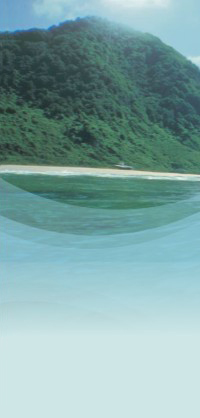

| Foreword |
| PROCEEDINGS OF THE 8th
INTERNATIONAL COASTAL SYMPOSIUM (ICS 2004) Itajaí/Itapema, Santa Catarina, Brazil, 14 to 19 March 2004 |
More than 8500 km in length, the Brazilian coastline
displays not only a great diversity of ecosystems but an abundance of natural coastal-marine resources as well. About
22% of the total Brazilian population is located in the coastal zone, almost forty million inhabitants.Within this context, it is
apparent that coastal environments constitute important areas
where many important economic and social activities are
concentrated. It is thus evident that the increasing socioeconomic
pressure on Brazilian coastal environments calls for
greater understanding of patterns of use, if these fragile
environments are to be conserved or maintained. With the
purpose to convene a meeting of international and national
coastal researchers that would encourage dissemination of
research results in this thematic area to scientific communities,
the Universidade do Vale do Itajaí (UNIVALI), through its
Centro de Ciências Tecnológicas da Terra e do Mar (CTTMar),
the Associação Brasileira de Oceanografia (AOCEANO) and
the Coastal Education and Research Foundation (CERF) jointly
organized the eighth (8th) International Coastal Symposium
(ICS2004). The intent was that this event would be a forum for
exchange of concepts and technology and discussion of these
important coastal ecosystems, from both national and
international perspectives. The symposium, based on its
potential scientific value to the coastal research community, has
gathered coastal researchers from around the world at one
location, where ideas were exchanged, considered, and
discussed. During the technical sessions, almost of four
hundred (402) scientific papers were presented in oral
presentations (182) and as posters (214). The poster sessions
provided opportunity for one-on-one discussion between
researchers. There were also eight (08) keynote lectures, four
(04) invited symposia, an international short course that took
place prior to the meeting at UNIVALI Itajaí Campus, two field
trips and two diving excursions that were specifically devoted to
the main themes of the meeting. This Special Issue of the Journal of Coastal Research entitled "8th International Coastal Symposium (ICS 2004)", with 402 professional papers comprising three volumes with 1902 pages, attests to widespread interest and participation in the meeting. Almost 500 delegates from 32 countries were officially registered to the meeting. Forty-six (46) delegates were supported by CERF-CNPq. The symposium, convened by UNIVALI-CTTMar, AOCEANO and CERF, was supported by Coastal Planning Engineering (CPE), Coordenação de Aperfeiçoamento de Pessoal de Nivel Superior (CAPES), Conselho Nacional de Desenvolvimento Científico e Tecnológico (CNPq), Fundação de Amparo a Ciência e Tecnologia do Estado de Santa Catarina (FUNCITEC), and Financiadora de Estudos e Projetos (FINEP). The Brazilian Program of Marine Geology and Geophysics (PGGM) also supported the event. Mycollegueas from the Organizing Committee and I would like to thank all the keynote speakers, who dedicated their time during almost eighteen (18) months to attend our invitation and came with financial support of the ICS Committee or by their own means. Your expertise in the different topics really increased the quality of the meeting. We must not forget the support of the Director of CERF, Professor Charles W. Finkl, and the President of Coastal Planning Engineering (CPE), Thomas Campbell. I also acknowledge the fifteen (15) survivors of the Organizing Committee. They did not hesite in sacrificing your time (weekends) to organize the meeting and also have managed to survive through my, sometimes demanding, requirements and well-known stoic behaviour. Finally, I thank all the delegates. The meeting and this special issue were a success because you worked hard to produce papers presented in the meeting. Without you, this meeting could not have existed. The ICS 2004 meeting, the first international meeting hosted by UNIVALI, occurred in an important and transitional time for the coastal group.We went through a phase of very hard work to promote development and growth over the last twelve (12) years and we are now taking our first steps towards scientific excelleney, with the support of the national and international scientific community. Founded in 1989, UNIVALI as a university is seventeen (17) years old. Fifteen (15) years ago, in 1992, the Oceanography undergraduate course was implemented. Today, we have nine courses merged into a Technological Center. We have almost 200 lecturers with almost 40 full-time professors and researchers. Our research focus embraces all facets of coastal zone research. Exactly twelve years ago I came to Itajaí, UNIVALI, with the same objective and dreams of my dear colleagues, the objective of building a research center while conducting quality research, enhance national education and introduce new capable professionals into our so called market of Brown Water Oceanography. Well, HERE WEARE in our journey. I must say that it was a long trip without a happy conclusion.You may well ask why this is so? The answer is because the trip hasn't ended yet and because happiness is in the journey itself and not arriving at the destination. Antonio Henrique da Fontoura Klein |